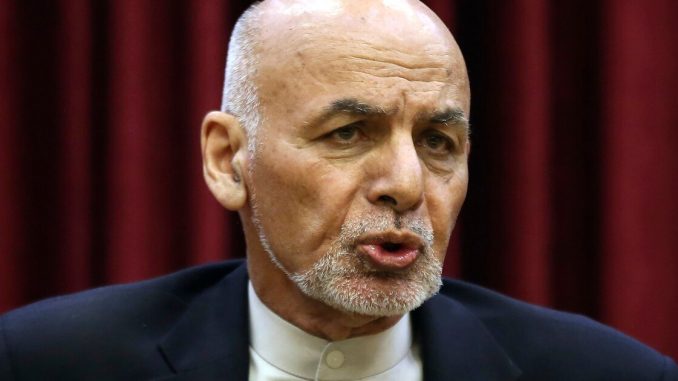
KABUL, Afghanistan — Afghan President Ashraf Ghani dashed hopes Friday for a start to negotiations with Taliban insurgents, announcing the final 400 Taliban prisoners whose release is a prerequisite to start talks, will remain jailed. The announcement frustrates U.S. efforts to find an end to Afghanistan’s years of relentless war.
Addressing the nation on the Muslim holy day of Eid ul Adha, Ghani said the 400 Taliban are convicted of crimes he has no authority to forgive. Instead, he will call a loya jirga — or traditional grand council of elders — to decide whether they should go free. He said the council would meet “shortly.”
Ghani’s announcement was certain to delay the start of negotiations between the warring sides and frustrate Washington’s efforts to bring an early end to hostilities, even as they scale down their presence in Afghanistan.
It also comes at the start of a three-day cease-fire announced by the Taliban for the Eid holidays.
/cloudfront-us-east-1.images.arcpublishing.com/mco/73Z3WTK4VZG5ZDLOIAQED2KGX4.jpg)
The prisoner releases were part of a deal the United States signed in February with the Taliban aimed at ending Afghanistan’s endless wars and sending U.S. troops home after nearly 20 years in Afghanistan, ending America’s longest war.
That deal, touted at the time as Afghanistan’s best chance at peace in four decades, called for the Afghan government to free 5,000 Taliban held in jails across the country and the Taliban to free 1,000 government and military personnel. The releases were to be a sign of good will and a prerequisite to the start of negotiations between the warring sides.
On Thursday, the Taliban concluded the release of the 1,000 they were holding, according to Taliban’s political spokesman Suhail Shaheen. He also said the insurgent group was ready to hold talks with Kabul’s political leadership within a week if the remaining Taliban still in jails in Afghanistan were freed.
But Shaheen told The Associated Press the Taliban would not accept substitutes to the 5,000 Taliban on the list agreed upon during the one-and-a-half years of negotiations with Washington.
Ghani in his speech said his government would free 500 Taliban who are not on the list saying it was a gesture of good will.
In response to Ghani’s announcement, Shaheen called his administration “an obstacle to peace.”
/cloudfront-us-east-1.images.arcpublishing.com/mco/IZ3GL5M3ZJAINGS465NAO6RDXI.jpg)
Shaheen told The Associated Press the Taliban freed 1,005 government personnel, militia members, military personnel and police. The last of the prisoners was freed Thursday.
“We freed all of them as a good will gesture so that they may pass their Eid days with their families and also we announced the cease-fire in order to create a conducive atmosphere for the start of intra-Afghan negotiations,” Shaheen said. “But on the other hand the head of the Kabul administration, instead of removing hurdles in the way of peace and intra-Afghan negotiations, is creating … hurdles and obstacles.”
The U.N. had expressed hopes for a start to negotiations within weeks, suggesting they may have begun in July, and called on both sides not to squander an opportunity at peace.
The U.S. Embassy in Kabul on Thursday issued a statement at the end of Khalilzad’s round of meetings with Afghan leaders in the capital repeating a call for an end to fighting and bloodshed and urged both sides to “seize this historic opportunity for peace.
A meeting of the loya jirga would require weeks to collect elders from throughout the country and it wasn’t clear how they would be chosen or whether Ghani’s political opponent and the current head of the High Council for National Reconciliation Abdulllah Abdullah supported the move.
Abdullah was tasked with overseeing the peace talks with the Taliban as part of a power sharing deal with Ghani earlier this year following disputed presidential election results.
There was no immediate comment from Abdullah to Ghani’s refusal to release the remaining Taliban prisoners.
Gannon reported from Islamabad.



Be the first to comment